- Home
- Scott Mariani
Star of Africa Page 23
Star of Africa Read online
Page 23
Khosa’s little smile was back. He pointed at Jude, then barked another command, and the two men shoved Jude roughly against the curve of the fuselage just behind the cockpit bulkhead and pressed him down to the floor. Jude thought they were going to shoot him. He raised his hands to protect his face and head, in that instinctive way people do under threat, as if their hands could stop a rifle bullet.
Jude wasn’t the only one convinced that he was about to be shot. Ben was certain of it. His heart restarted, pulse racing, and he felt himself redden as he half-rose out of his seat with his guts twisting and fists clenched. Whatever happened, he wouldn’t, couldn’t allow that to happen to Jude.
Khosa pointed his .44 Magnum at Ben, with the same half-smile curling his lips. Now it was Khosa’s turn to shake his head and say Don’t even think about it.
Ben froze. There were just too many guns. And there was nothing he could do, except die a futile death trying in vain to save his son. He lowered himself into his seat. In that moment, he wanted this man Khosa gone more than he’d ever wanted anything in his life. Sooner or later, one way or another, it was going to happen. Khosa had just sealed his own fate.
The rifles pressed against Jude’s head. Jeff’s face was drawn so tightly that the bunched muscles in his jaws looked as if they were about to snap. Tuesday’s eyes were wide and his face was as pallid as it was possible for an Afro-Jamaican’s face to be.
But Khosa’s men didn’t shoot Jude. That wasn’t Khosa’s intention. Not yet.
The two who had grabbed Jude stepped back and steadied their backs against the fuselage with their rifles still pointing at his head, holding him in his uncomfortable curled-up position on the floor, jammed up against the curve of the opposite wall and the bulkhead next to him. The other three resumed their positions at the ends of the facing rows of seats, guns aimed at the rest of the prisoners, and especially at Ben.
Khosa nodded to himself in satisfaction, holstered his revolver and returned to the cockpit. His orders were clear. If they try any of their tricks, the boy dies. As if he really had been able to read their thoughts and predict their intentions down to the last detail.
It was uncanny. Ben was shaken by it.
Jeff looked at Ben with a ‘what now?’ expression.
Ben shook his head. Stand down. Mission aborted. Their one chance had come, and now it was gone again. There was no longer anything they could do, except sit very still, and wait to find out what Khosa planned for them, and hope that another chance might come their way. That didn’t look very likely right now.
The helicopter thudded on.
An hour passed. Ben kept his eye on the cockpit and noticed the way the pilot’s head kept dipping, as if he was anxiously checking his gauges. Ben could guess which gauge in particular. The chopper must be literally running on fumes by now. And they must have passed over the Somali coastline by now, too, although there was no way to tell from where he sat. All he could see through the cockpit windows up ahead was clear blue sky.
Ben was still counting the minutes a little while later when he saw Khosa, up front, turn to the pilot and say something. He was pointing through the glass. The pilot nodded and they seemed to exchange a few words.
The chopper began to descend. The view through the windscreen changed from open clear sky to an arid and endless semi-desertified rock-strewn landscape dotted here and there with sparse, sun-withered vegetation. They had passed over the coast, that was for sure. They were some indeterminate distance inland, apparently far from any kind of civilisation, which in Somalia accounted for the vast majority of the country’s land mass.
Minutes later, the helicopter finally touched down. There was a bump as the skids settled on solid ground. Back on land again for the first time since driving Geedi’s Land Cruiser off the beach and into the sea at Hobyo. For Jude and his fellow Andromeda crew survivors, it was their first landfall since Djibouti. But there wasn’t one of them who wouldn’t rather still be drifting at sea aboard their raft with only sharks for company.
The chopper pilot began shutting everything down. The screech of the turbine slackened to a roar, then to a rumble. Khosa’s men burst into action, over-enthusiastically pointing their weapons here and there as they jabbered in Swahili. The fat one with the shotgun yanked open the side hatch. Searing-bright sunlight flooded into the Puma. ‘Up! Up!’ he yelled in English, jerking his big black autoloader at the prisoners. The nose picker and the skinny one standing guard over Jude seized him by the arms and hauled him to his feet.
The rotors were winding gradually to a standstill as the seven prisoners were made to disembark at gunpoint. Condor was just too sick to jump down unaided from the edge of the hatch. Ben and Jeff took charge of helping him down to the ground. Within moments, the glaring white heat of the late afternoon sun was already sticking their T-shirts to their backs. The air was still and oppressive and almost too thick to breathe. After the shade and cool of the draughty aircraft it was like stepping into a kiln.
‘Hurry! You hurry!’ the fat soldier yabbered impatiently at them, looking as if he wanted to loose off a whole magazine of twelve-gauge buckshot.
‘Tell that bastard if he doesn’t get out of my face, I’m going to skin him and wear him as a fucking wetsuit,’ Jeff said between clenched teeth as they carried Condor down from the edge of the hatch and set him carefully on his feet.
‘Ten sizes too big for you,’ Tuesday said.
Ben said nothing, but gave the fat soldier a look that made him back off a step.
The Puma had landed inside a large compound that at first glance appeared to Ben to be a deserted government installation or military base. The ground was pounded earth that had been levelled flat and cleared of rocks, everything lightly covered with a layer of sandy dust blown in from the deserts of the north. Roughly in its centre, arranged into two strung-out blocks either side of a long, broad avenue like a street, there stood a dozen or so cinder-block buildings of different sizes and in different states of repair ranging from more or less undamaged to crumbling ruin. The wider compound was a stretched-out rectangle, maybe a hundred metres across at its narrowest, and maybe three times as long. Its outer perimeter was ringed with sagging wire mesh hung from concrete posts and topped with curls of razor wire. Outside the fence, the rocky ground stretched out flat to infinity, dotted here and there with sparse clumps of bush and the odd stunted-looking tree standing sad and alone.
At some time in its history the place could have been a base for government troops, or for one of the many rebel factions that had been vying for power in Somalia during the country’s civil war years. But, much like the hopes of most of those same factions that they could create from the ashes of war a better, happier Somalia for themselves and their children, it had been abandoned years ago and was on the fast track to becoming completely derelict. The largest of the buildings had a long, windowless side wall that was as heavily pocked and bombarded with so many bullet craters that it resembled the lunar surface. Africa was full of walls like that, where you could only guess at how many poor souls, the young with the old, had been lined up and then executed by firing squad.
Khosa’s Puma wasn’t the only aircraft on the ground within the compound’s perimeter. A second and a third helicopter rested on their skids a short distance away, parked in ragged single file close to the buildings on one side of the broad beaten-earth avenue. They had got there long enough ahead of the Puma for their rotors to have stopped turning, the heat shimmer from their engines to have faded away and their heavily armed occupants to disembark and hang around waiting for their commander to arrive.
Ben’s guess had been right when he’d thought Khosa wouldn’t have undertaken a search of a vast spread of ocean with a single aircraft. He’d evidently marshalled his whole private air force. Which, even by African standards, was nothing to write home about.
The choppers were a matched pair of antique Bell Iroquois that looked as if they’d been in service through the whole o
f the Vietnam war and gone on to see heavy action in every African conflict of the last forty or so years. They were in even worse shape than the Puma, and seemingly just as low on gas after what must have been a long, intensive search launched from the moment that Khosa had reached shore in the MOB lifeboat. The fourth vehicle in sight was a battered commercial truck with a ripped canvas soft-top and oversize wheels. It too was parked alongside the buildings, tucked in to the side of the avenue with its rear backed up close to the leading Iroquois. Hitched up behind the truck was a long trailer with a pair of large, rust-streaked metal tanks bolted to its flatbed, which Ben realised was a transportable fuel bowser for the choppers. A rubber hose was connected between the nozzle on the fuel bowser and the first Iroquois. A motorised pump was roaring and grinding away. The rubber hose was twitching and pulsing on the hard-packed dirt like some bloated snake as fuel flowed through to the helicopter’s tanks. Some of the men were attending to the refuelling. Others lounged nearby, talking and joking among themselves and smoking cigarettes with reckless disdain for the flammable fumes Ben could smell all the way from where he was watching.
In his time Ben had seen a lot of military units that could have been described as ‘irregular’. Spit-and-polish parade-ground perfection and exact adherence to regulations meant little to him in the real world, because some of those irregular units had contained the best fighting men anyone could wish to have on their side, or fear to have as their enemy. He’d seen Delta Force guys on operations in Sudan and Afghanistan who looked like bearded hobos. SAS operatives in deep-cover missions in the Middle East whom you couldn’t tell apart from the insurgents they were hunting. He’d been one of those men himself, in another life.
But there was a line. Irregular on one side, tin-pot on the other. On the right side of the line it didn’t matter how the soldiers looked, because underneath they were all about iron discipline and unflinching professionalism. Men you could stake your life upon in even the direst of circumstances. On the wrong side of the line, they were just a disorganised rabble that would crumble into chaos at the first shot fired.
And Khosa’s unit was exactly that: an undisciplined, untrained, unsoldierly bunch of clowns with guns. Ben had seen it during the storming of the container ship. He was seeing it now. Most of the men were draped in bandoliers of gleaming pointed rifle cartridges looped diagonally around their torsos or draped around their necks like a kind of twenty-first-century lion-tooth necklace. Wraparound Ray-Bans and mirrored aviator shades were pretty much standard issue in this squadron, along with the gold chains and gold teeth on display when they laughed, which they were doing a lot of. Several had clusters of grenades fixed to their vests like bunches of strange fruit. Others had machetes thrust into their belts, like pirate cutlasses of old, or dangling sheathed from leather baldrics slung over their shoulders. In a nod to proper military dress a few were wearing red berets, and several had the four-colour DPM combat jackets of the pattern Ben had seen on Kenyan UN-affiliated peacekeeping troops in Sierra Leone, back in the day.
But even a tin-pot bunch of clowns with guns were dangerous, if there were enough of them. Worse than dangerous.
Ben did a quick head-count. He could see eleven of the enemy around the Bells, plus four more around the truck. Plus the five soldiers from the Puma, plus the pilot, plus Khosa himself, made twenty-two. Not counting any who might be inside the buildings. Not one man he could see wasn’t armed with some variety of automatic weapon. Mostly Kalashnikovs, naturally, which in their tens of millions were the most abundant piece of hardware in Africa; a few American M16s, a few ancient FNs, a couple of Uzi submachine guns, plus a couple of heavy machine guns. It all added up to an awful lot of bullets that would be coming their way, if any of the prisoners made any rash moves.
Not good. Not the most sensible thing at this point.
Then as Ben watched, Khosa jumped down from the co-pilot side of the Puma’s cockpit and went to meet his troops.
Chapter 39
The crews from the two Bell Iroquois and the men by the fuel truck all turned as Khosa made his appearance. He strode across the avenue between the rows of buildings, kicking up clouds of dust with his boots. As he neared the gathered crowd of his men, he reached into his pocket and brought out the diamond in its leather pouch for all to see. He held it high in the air like a trophy and yelled ‘I have it! You see? I have it!’
His men greeted him like a conquering hero returning from a victorious military campaign. Laughter and yells and whoops of triumph echoed around the compound, and a few did the tin-pot army thing of stabbing their rifles straight up like spears and loosing off a string of shots in celebration. The crackle of the gunfire sounded hollow and flat in the oven-dry air.
‘Are you all right?’ Ben asked Jude, squeezing his shoulder.
Jude gave a nod and managed a smile. ‘I’m fine,’ he replied. ‘I never really thought they were going to shoot me. Just playing around, acting tough. I wasn’t worried.’
‘Nor was I,’ Ben lied. ‘It’ll all be fine. Just you wait and see.’
‘Move! Move!’ barked a voice behind them. It was the fat soldier again, joined now by the skinny one and the nose picker, jabbing gun muzzles at them and motioning urgently towards the buildings.
Jeff pointed a warning finger at the fat one. ‘Hey. You. Back off. I’m telling you. Before I ram that shotgun down your throat so hard it’ll come out of your arse, butt end first.’
‘I wouldn’t provoke them, Jeff,’ Tuesday advised him with a frown. ‘Especially chubby cheeks there. He’s just itching to blow us away, first chance he gets.’
Gerber and Hercules each had one of Condor’s arms, without which the sick man couldn’t have remained upright for long. ‘What the hell is this place anyway?’ Gerber said. ‘Why’d they bring us here?’
Hercules nodded grimly towards the largest of the buildings, the one with the heavily bullet-cratered wall. ‘You blind, homes? Don’t you see that wall right there? It’s a motherfuckin’ execution yard, is what it is. They ain’t takin’ us inside. They’s gonna line our asses up along that there wall and put us down like a buncha dogs.’
‘We’re not dead yet,’ Jeff said.
‘Move! Move! You walk!’ the fat soldier barked, urging them on. Then, scowling at Condor, ‘What wrong with him?’
‘He needs a doctor,’ Ben told him in Swahili. ‘Either leave him alone or go and fetch one, right now.’
‘No doctor! No doctor!’
‘Then get us some water,’ Ben told him. ‘For God’s sake, these men are thirsty.’
‘No water! No water!’
‘Yeah, right.’ Hercules shook his head. ‘No doctor, no water, ’cause why waste it on a dead man? This is it, my friends. End of the line, I’m tellin’ you. But not for all of us.’
Releasing Condor’s arm for a moment, Hercules opened up the flap of his baggy jacket pocket and let Murphy clamber out onto his hand. Hercules raised his arm up high.
‘Go, Murph. Get out of here. Go!’
The parrot blinked at Hercules, then flapped its wings and took off. Hercules watched it go, nodding wistfully to himself.
Then the boom of the fat soldier’s shotgun cut through the desiccated air like a grenade blast. The flying bird exploded in a cloud of feathers. Murphy’s mangled carcass dropped to the earth floor of the compound. Laughing, the fat soldier walked over to it and crushed what was left of it into the dirt with the heel of his boot.
That was the last thing the fat soldier would be doing for a while. Because when he turned back round to grin at the prisoners, he was met by Hercules’s ham-sized fist coming at him like a wrecking ball with two hundred and fifty pounds of muscle behind it. The punch spread his nose into a bloody pulp across his face and slammed him hard to the earth. With a roar of pure rage, Hercules was about to finish the guy off with a stamp to the head when Jeff and Tuesday rushed forwards and grabbed Hercules by the arms to restrain him.
‘You want to d
ie, big man?’ Jeff said in his ear. ‘Keep it up.’
‘Gonna die anyway. Fuck’m! Fuck’m all!’
The fat soldier was stone unconscious. His comrades were all yelling and screaming and jabbering and waving their guns. Khosa turned to see what was happening. More of his men came running. In two seconds, Hercules was surrounded by rifle muzzles. Ben, Jude, Jeff and Tuesday stood shoulder to shoulder with him. Ben eyed the nearest yelling African and got ready to make a grab for his rifle. If this was how it was going to end, then so be it. You could have death, or you could have glory, but sometimes you had to settle for both at once.
Then Khosa shouted, ‘Stop! Hold your fire!’
The circle of guns backed off and opened up to lead the way.
The seven prisoners were marched towards the large building. Hercules shooting glares of grief-stricken hatred at every man who dared come within punching distance. Jude helping Gerber to steady Condor on his feet. Ben and Jeff glancing at each other and both wondering the same thing. Why had Khosa stayed his men?
Ben was worried. Because he had a feeling he knew the answer.
Hercules had been wrong. The soldiers didn’t line them up along the wall to be shot, but instead prodded and shoved them inside the building. It was a bare one-room shell inside, long and low, cool and dark and dank. The compacted earth floor was littered with broken glass and garbage, but most of all it was littered with empty cartridge casings. Piles of them, two or three deep in places, trodden into the dirt. Ben felt them underfoot as he stepped inside and instantly knew what they were, even without looking. Just as he knew that the fired shells would be mostly concentrated at one end of the room. Just as he knew why, without needing to peer into the shadows to examine the far wall and make out the craters that scarred the inside of the blockwork as well as the outside.

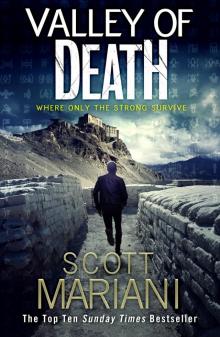 Valley of Death
Valley of Death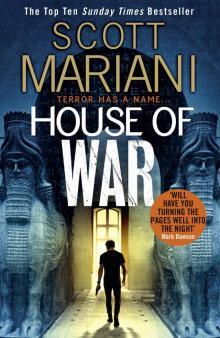 House of War
House of War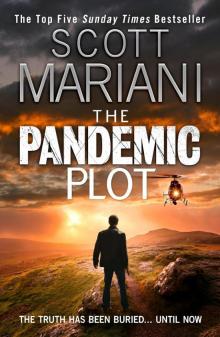 The Pandemic Plot
The Pandemic Plot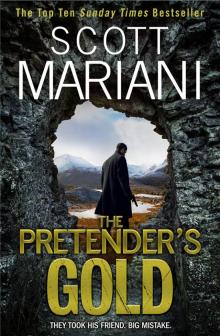 The Pretender's Gold
The Pretender's Gold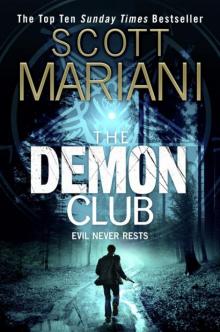 The Demon Club
The Demon Club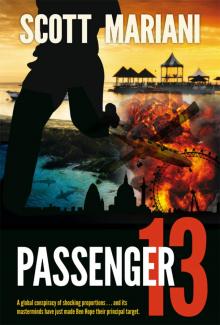 Passenger 13 (Ben Hope eBook originals)
Passenger 13 (Ben Hope eBook originals)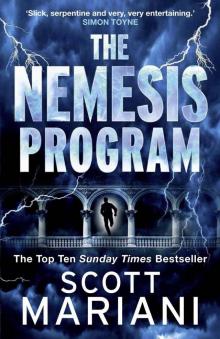 The Nemesis Program_Ben Hope
The Nemesis Program_Ben Hope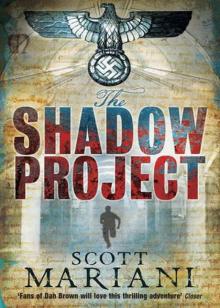 The Shadow Project
The Shadow Project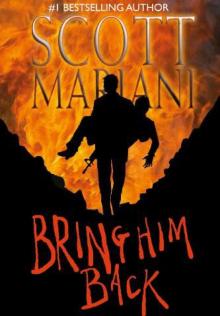 Bring Him Back
Bring Him Back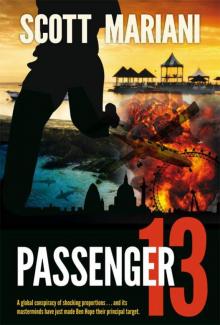 Passenger 13
Passenger 13 Sacred Sword (Ben Hope 7)
Sacred Sword (Ben Hope 7)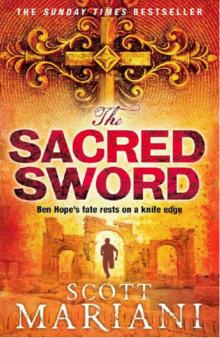 The Sacred Sword (Ben Hope 7)
The Sacred Sword (Ben Hope 7)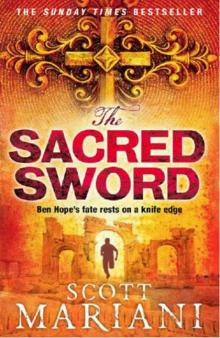 Sacred Sword
Sacred Sword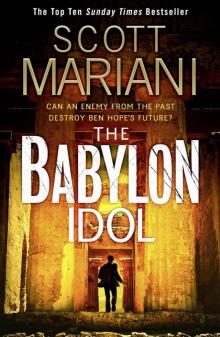 The Babylon Idol
The Babylon Idol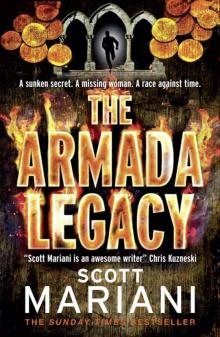 The Armada Legacy
The Armada Legacy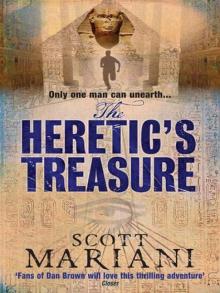 The Heretic's Treasure
The Heretic's Treasure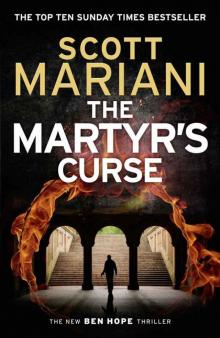 The Martyr’s Curse
The Martyr’s Curse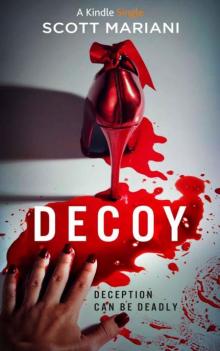 DECOY (Kindle Single)
DECOY (Kindle Single)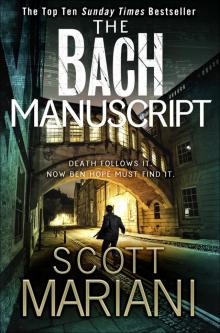 The Bach Manuscript
The Bach Manuscript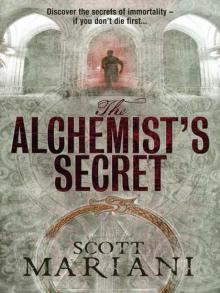 The Alchemist's Secret
The Alchemist's Secret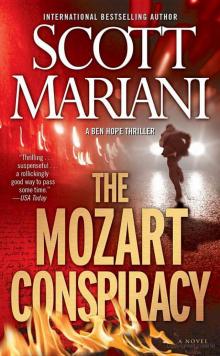 The Mozart Conspiracy: A Novel bh-2
The Mozart Conspiracy: A Novel bh-2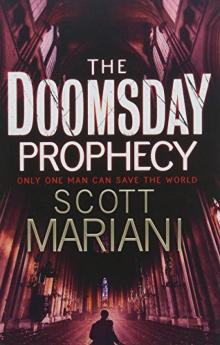 The Doomsday Prophecy
The Doomsday Prophecy The Ben Hope Collection: 6 BOOK SET
The Ben Hope Collection: 6 BOOK SET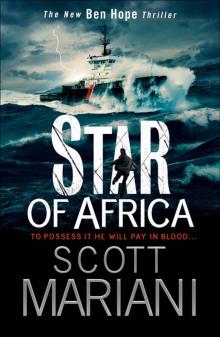 Star of Africa (Ben Hope, Book 13)
Star of Africa (Ben Hope, Book 13)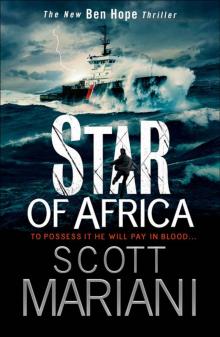 Star of Africa
Star of Africa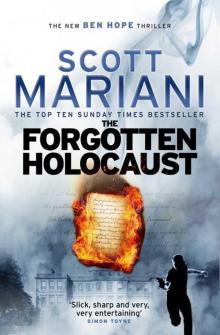 The Forgotten Holocaust (Ben Hope, Book 10)
The Forgotten Holocaust (Ben Hope, Book 10)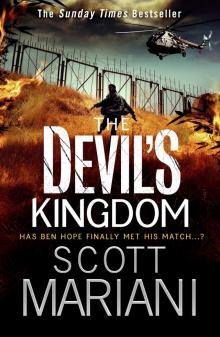 The Devil's Kingdom
The Devil's Kingdom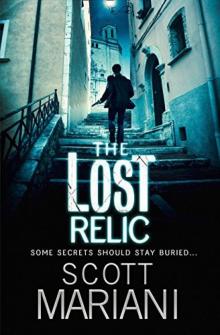 The Lost Relic
The Lost Relic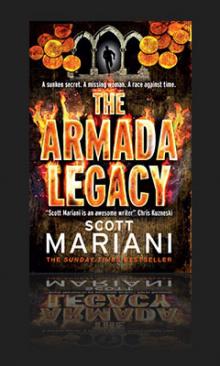 The Armada Legacy bh-8
The Armada Legacy bh-8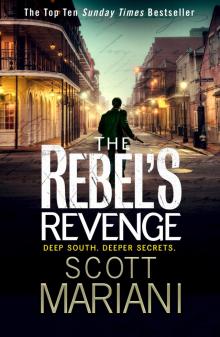 The Rebel's Revenge
The Rebel's Revenge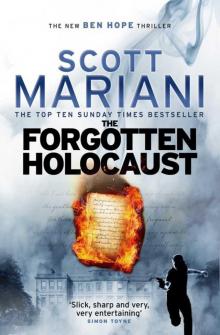 The Forgotten Holocaust
The Forgotten Holocaust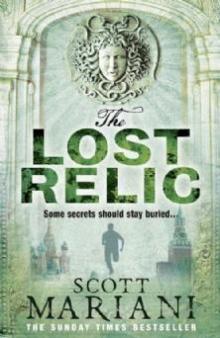 The Lost Relic bh-6
The Lost Relic bh-6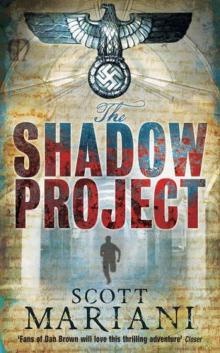 Ben Hope 05 - The Shadow Project
Ben Hope 05 - The Shadow Project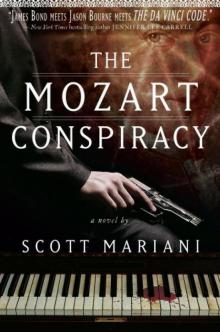 The Mozart Conspiracy
The Mozart Conspiracy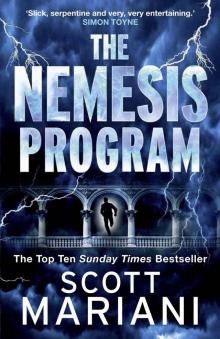 The Nemesis Program
The Nemesis Program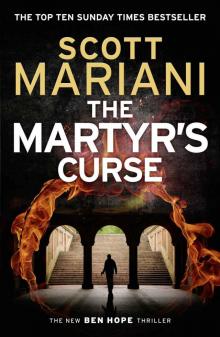 The Martyr’s Curse (Ben Hope, Book 11)
The Martyr’s Curse (Ben Hope, Book 11)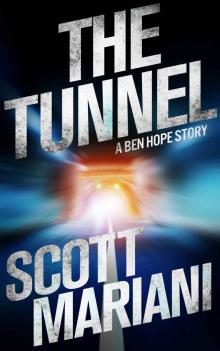 THE TUNNEL: A Ben Hope Story
THE TUNNEL: A Ben Hope Story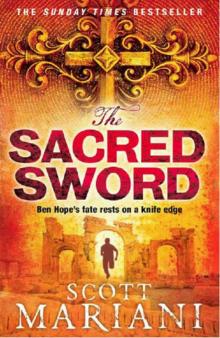 The Sacred Sword bh-7
The Sacred Sword bh-7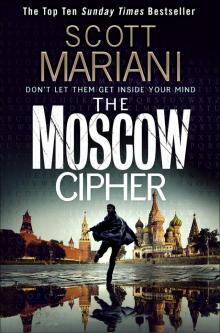 The Moscow Cipher
The Moscow Cipher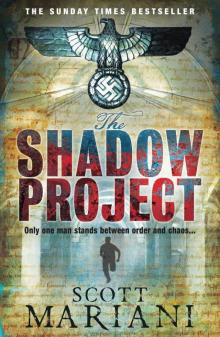 The Shadow Project bh-5
The Shadow Project bh-5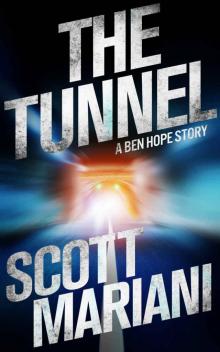 The Tunnel
The Tunnel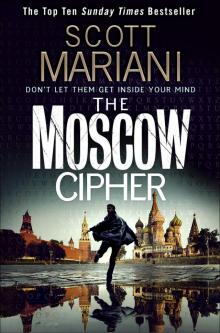 The Moscow Cipher (Ben Hope, Book 17)
The Moscow Cipher (Ben Hope, Book 17)